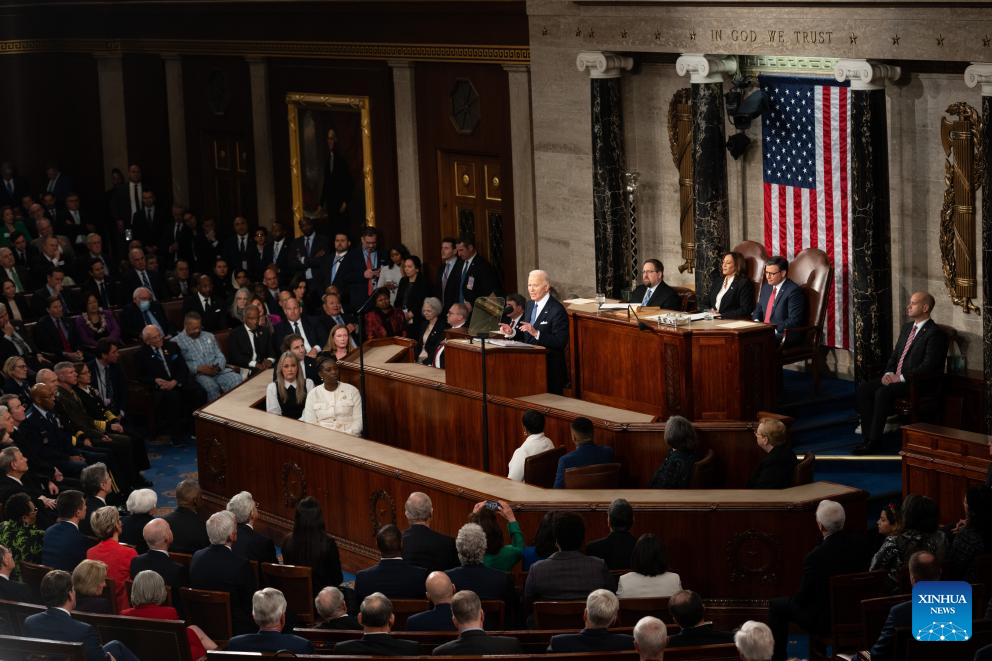Perceiving the underlying truth of Biden's State of the Union address

U.S. President Joe Biden delivers his State of the Union address at the House Chamber in Washington, D.C., the United States, March 7, 2024. (Xinhua/Liu Jie)
WASHINGTON, March 8 (Xinhua) -- Amid widespread concerns over high prices, economic uncertainty, the border crisis and geopolitical tensions, U.S. President Joe Biden delivered a highly partisan State of the Union address on Thursday night.
Despite attempts to convince voters that his policies have been successful and to vie for a second term, Biden faces continued low approval ratings, with a majority of Americans worrying that the United States is headed in the wrong direction.
AN UNCERTAIN ECONOMY
"I inherited an economy that was on the brink. Now our economy is the envy of the world!" Biden said in his third State of the Union address at the House chamber.
During Biden's term in office, it's true that unemployment has stood at historic lows. But it's also true that Americans have seen the worst inflation in 40 years. That is particularly the case with the costs of food and shelter, which are putting a dent in Americans' wallets.
A recent Gallop poll showed that 45 percent of Americans rate current economic conditions in the country as "poor." Inflation continues to affect a majority of Americans, with 17 percent saying it is a "severe" hardship affecting their ability to maintain their standard of living and 46 percent reporting it is a "moderate" hardship, the poll showed.
"I think one wrong move, we could be in a very bad place again. For lack of a better term, we could be financially in COVID, we could be in a lockdown financially," James Hester, a restaurant owner in South Carolina, told Xinhua earlier.
"I am personally a little concerned about the economy right now. I think there's uncertainty. I think there are a lot of fluctuations," Marlene Tucker, an independent voter told Xinhua at a polling station in Arlington, Virginia on Super Tuesday.
The president's approval is at a low point, sinking to 39 percent in the most recent Real Clear Politics polling average. Only 40.5 percent approve of Biden's job on the economy.
Biden's term in office comes at a time when over two-thirds of Americans believe that the nation is headed in the wrong direction, according to the latest Real Clear Politics polling average.
A RE-ELECTION BID
Biden assailed his predecessor and likely 2024 presidential election rival, Donald Trump, in his State of the Union address, as he sought contrast with the Republican on a series of issues key to this year's campaign.
"Attacking his opponent directly in the first minutes of his speech is unprecedented and perhaps the most partisan start to a State of the Union address in modern memory," said Marc Thiessen, former speechwriter in President George W. Bush's administration, calling it "an utter disgrace."
Biden consistently criticized Trump, yet he didn't mention Trump's name. Instead, he used the term "my predecessor" over 10 times in his speech.
"Insurrectionists stormed this very Capitol and placed a dagger at the throat of American democracy," Biden said, referring to the Capitol riot on Jan. 6, 2021, when a crowd of Trump's supporters violently broke into the Capitol building and interrupted the certification of the 2020 presidential election, in which Biden won.
The Democratic incumbent accused Trump and some Republicans of trying to "bury the truth of January 6th," calling election lies the "gravest threat to democracy" since the Civil War.
Trump, criminally indicted over the Capitol riot, has denied responsibility for the violence and lashed out at Biden and Democrats over what he calls a "witch hunt."
Trump, on his social media platform, alleged that Biden is "a threat to democracy" and that "he weaponized government against his opponent."
After sweeping to victory in their respective party's presidential primaries on Super Tuesday, this year's presidential election is edging toward a Biden-Trump rematch.
In a Reuters/Ipsos poll in late January, 67 percent of the respondents said they are tired of seeing the same candidates in presidential elections and want someone new.
BORDER POLICY UNDER FIRE
Abortion, one of the most divisive issues in America, is a major topic in this year's presidential election.
The Supreme Court had removed states' discretion to regulate abortion in 1973 and created a federal right to abortion in the case of Roe vs. Wade. But in June 2022, the highest court in the nation reversed five decades of legal precedent in one fell swoop, a controversial decision that eliminated federal protection of abortion rights for women in the United States.
Three Trump appointees -- Justices Neil Gorsuch, Brett Kavanaugh and Amy Coney Barrett -- voted to overturn Roe v. Wade.
While alleging Trump and many Republicans "are promising to pass a national ban on reproductive freedom," Biden said that he would "restore Roe v. Wade as the law of the land" if Americans elect a Congress that supports the right to choose.
Immigration has become a tough issue for Biden as he aims for reelection. Most Americans don't approve of his performance on the handling of immigration, according to polls. Trump has been attacking Biden on the campaign trail over the issue.
Biden blamed Trump for the collapse of a bipartisan border deal, which included a new emergency authority for the U.S. president to temporarily shut down the border when the number of migrants at the border is overwhelming.
"Unfortunately, politics have derailed it so far," Biden said in his State of the Union speech. "I'm told my predecessor called Republicans in Congress and demanded they block the bill," Trump responded on the issue, slamming Biden's border bill as "a disaster."
U.S. Senator Katie Britt, a Republican from Alabama, delivered the party's response after Biden's State of the Union address, saying that the president created the border crisis and has "coddled criminals."
Britt also criticized Biden for being "out of touch," arguing that "under his administration, families are worse off" and that "our communities are less safe, and our country is less secure."
WIDESPREAD DISAPPROVAL OVER GAZA
This year's State of the Union address, Biden's last one during the current presidential term, came amid the protracted conflict between Ukraine and Russia, which saw lawmakers get increasingly frustrated with relentless U.S. military aid to Ukraine, as well as continued Israeli air and ground offensives in Gaza that made the humanitarian crisis suffered by Palestinian civilians more dire day by day.
By reiterating the urgency of continuing the U.S. weapons supply to Ukraine right at the beginning of his speech, Biden not only sought to frame the issue as an indication that "freedom and democracy are under attack," but also, more importantly, aimed to sharpen his attack on Trump, his probable general election rival.
Biden blasted Trump over what he considered to be the former president's recent pro-Russia comments, while lambasting Republicans who blocked the Ukraine aid money for what he said was them wanting to see the United States "walk away from our leadership in the world."
On the Gaza crisis, what was particularly notable was Biden's announcement that he is directing the U.S. military to lead a coalition effort to build a temporary pier off the coast of Gaza, so that additional humanitarian aid could be delivered to civilians residing in the region.
The plan, about which few details have been divulged, is yet another indication of Biden's growing frustration with the way Israeli Prime Minister Benjamin Netanyahu is carrying out the military operation in Gaza to root out Hamas.
It shows a shift in U.S. strategy away from solely counting on Israel's willingness to allow more aid into Gaza, at a time when the humanitarian crisis becomes increasingly dire day by day.
Polls revealed that voters generally disapprove of Biden's management of the conflict between Israelis and Palestinians. Younger Americans are particularly critical, expressing dissatisfaction with both Israel's actions and the administration's handling of the Gaza crisis.
Over 101,000 Michigan voters recently cast their votes as "uncommitted" in the state's Democratic primary to protest Biden's handling of the Israeli-Palestinian conflict, a warning sign from the key swing state for the general election.
Photos
Related Stories
- Biden touts progress on economy, immigration despite wide disapproval
- Tire falls off United flight departing from San Francisco
- New York takes extraordinary measures to tackle subway crimes
- California residents grapple with higher prices despite inflation dip
- Commentary: More countries are rejecting U.S. calls to take sides, why?
- U.S. economic activity slightly increases amid persisting price pressures: Fed Beige Book
Copyright © 2024 People's Daily Online. All Rights Reserved.









